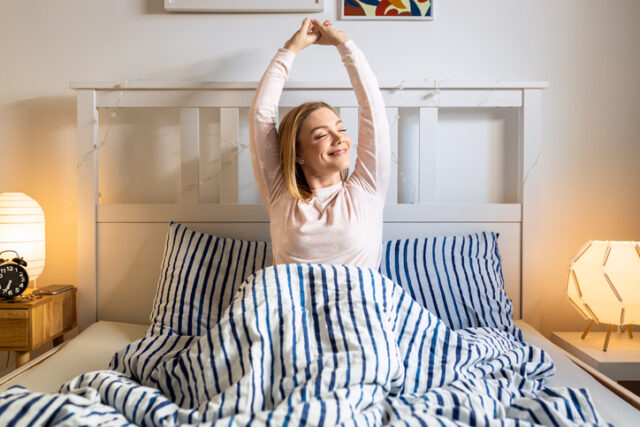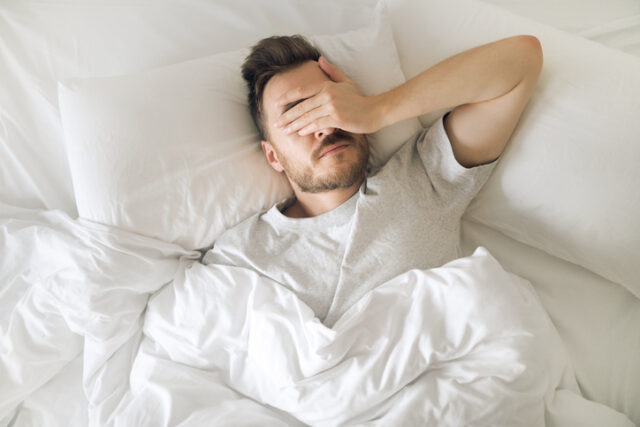Everyone knows the importance of good rest, but there’s still a lot many people don’t know about sleep.

While it’s important to rejuvenate your mind and body, there are lots of other cool things about humans’ need to close our eyes and conk out for eight hours (if we’re lucky!) a night that you’ve probably never heard of and that might surprise you.
1. Dreams help process your emotions.

When you sleep, your brain replays emotional memories to help you process and store them. So if you’ve had a rough day, a good night’s sleep can actually be your brain’s way of letting go and moving forward. Think of it as your mind’s nightly therapy session.
2. You can train yourself to wake up without an alarm.

With consistent sleep habits, your body’s internal clock can learn when it’s time to wake up. Regular bedtimes and wake-up times help set your circadian rhythm, making it possible to wake up refreshed without a blaring alarm. It’s a natural, peaceful way to start your day.
3. “Sleep debt” is real but can’t always be “repaid.”

Sure, you can catch up on a little lost sleep over the weekend, but prolonged sleep debt affects your body and mind in ways a few extra hours can’t fix. Chronic sleep loss can lead to lasting health issues, so it’s better to stay consistent than to rely on catch-up naps.
4. Sleep cycles repeat roughly every 90 minutes.

Each night, your sleep goes through cycles of light, deep, and REM sleep. These cycles last about 90 minutes, and understanding them can help you wake up at a more restful moment. There’s even a trick to timing your wake-up so it’s at the end of a cycle, which can make mornings a lot smoother.
5. You need more sleep when you’re sick.

Your body uses sleep to fight off illness and repair cells. So, if you’re battling a cold or recovering, extra sleep isn’t just a luxury—it’s a necessity. That time in bed gives your immune system the energy it needs to work its magic.
6. Your brain never fully “shuts off” during sleep.

Though your body rests, your brain stays active, processing memories, consolidating learning, and even making decisions. This is why some people “sleep on it” and wake up with new clarity. Sleep is like a nightly reset, helping your mind make sense of the day’s events.
7. Blue light disrupts your sleep more than you think.

It’s not just hype—blue light from screens really does mess with your sleep by tricking your brain into thinking it’s daytime. This light blocks melatonin production, making it harder to fall asleep. Simple solutions like dimming screens or using blue light filters can help your body ease into sleep mode.
8. Sleeping in a cool room can improve your sleep quality.

Studies show that cooler room temperatures, typically between 15-19°C, help people fall asleep faster and sleep more deeply. A cool room signals your body that it’s time to rest, making it easier to drift off and stay asleep through the night. Small adjustments can make a big difference.
9. Most people have a “sleep personality.”

Ever wondered why some people are early risers while others are night owls? Sleep personality, or chronotype, is a real thing influenced by biology. Knowing yours can help you work with, rather than against, your natural tendencies for a better sleep routine.
10. You can get by on less sleep—but it’s not ideal.

Some people have a rare genetic mutation that lets them feel fine on about six hours of sleep, but most of us aren’t so lucky. If you feel like you’re one of those people, remember that skimping on sleep still impacts your health, mood, and focus, even if you don’t immediately feel it.
11. Naps can’t replace a full night’s sleep—but they can help.

A quick nap can boost alertness and improve mood, but it doesn’t give your body the full benefits of deep sleep. Napping is a great pick-me-up, especially if you’re sleep-deprived, but it’s not a substitute for a full, restful night. Think of naps as a bonus, not the main event.
12. Sleeping on your back can be best for spinal health.

Your sleeping position impacts how well you rest. While it’s not the same for everyone, many find that sleeping on their back helps maintain spinal alignment and reduces pressure on joints. It’s worth experimenting with positions to see what leaves you feeling best.




